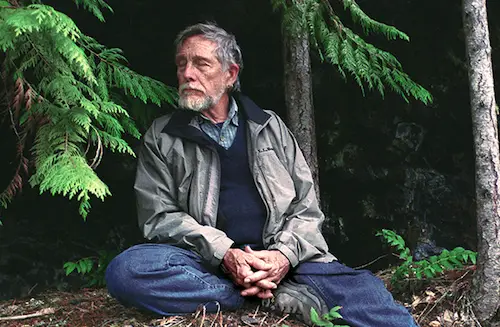It’s difficult to get things done in the summer. Some people are busy with work or school, and others have a lot of activities to squeeze in before the chilly fall season rolls up. But that doesn’t mean you have to give up on reading.
For those days when a little word appreciation is needed but you don’t have time for a full novel, poetry is just the answer. To that end, I’ve gathered three of Gary Snyder’s short, desert-inspired poems. Be warned — these poems will definitely make you think about life.
Snyder is a well-known poet of the Beat Generation, and has been known to explore topics pertaining to nature, time, religion and humanity. The 88-year-old’s poems often evoke images of the Midwestern American desert, rife with snakes and scorpions and a glowing, comforting heat.

Merging that liminal desert space with questions of spirituality is how Snyder manages to captivate audiences, and that merger is exhibited perfectly in this first poem, “Burning Island.”
1. “Burning Island”
Written in 1970 and capturing an old-time “O Heavenly Father” vibe, “Burning Island” is a prime example of how Snyder can talk about marriage while also marrying together two of his most relevant concepts: prayer and nature.
Visually, this poem is a back and forth of heat and cold, water and earth. Descriptions of breaking waves, the “half-gone waning moon” and the pink and silver sea bream bring readers to the edge of the ocean. The immediate transition to the “Volcano belly Keeper” drenches readers in misty warmth.
On a boring summer day, “Burning Island” can transport you to a flourishing island engulfed in the mysteries of old gods and creators. The title seems to purposefully provide the wrong idea — this island burns not in destruction, but in growth.
And that growth is determined by the gods of old, the Wave God and Volcano belly Keeper who control the sea and sand, and the Sky Gods dancing across the horizon as rainclouds. This prayer is to no one and to everyone, and really makes you consider who or what is out there.
Even if this poem doesn’t make you want to sit in a field and say things like “The universe is righteous, man” to your closest friends, “Burning Island” should at least show you the happiness and hope of a little prayer. The entire second-to-last stanza is a desire for peace — for fields to yield crops and friends to yield comfort. Overall, the narrator wishes for a blessing on their marriage.
“Burning Island” is a sticky-sweet pick me up for a down summer day. Let Snyder’s tiny prayer of blessing mend your aching soul, and feel a little more enlightened afterward.
2. “Milton by Firelight”
The title of this poem is a little misleading, which seems to be a trend with Gary Snyder. “Milton by Firelight” is not a candle-side homage to the dead poet John Milton — really, it could be retitled “Why Does Milton Matter When the World Eventually Goes to Hellfire?” As a man of words, Snyder knew this wasn’t the best choice, and opted for the shorter version.
In reality, “Milton by Firelight” explores humans in a stark, straightforward way. Published in 2003, the poem is much more recent than “Burning Island,” but maintains all those nature-spiritual ideas that the poet holds so dear.
Snyder uses images of a man working with stone and of people searching for food and a place to sleep. All of it, too, is in the outdoors, where the toil and trouble of our ancestors first began.
The poem takes an interesting turn when it discusses how the Sierras will eventually be uninhabitable thanks to humans. The juxtaposition of individual human survival and eventual human destruction is interesting enough to warrant a summer read.

The layers keep popping up the further you think — why would a poet write a poem about how poetry isn’t going to matter? Gary Snyder paints the human condition with vivid images of “ice-scratched slabs” and “the very guts of rock” for a reason. Perhaps he wants to show the connection between humans and nature — humans have guts! — or the perseverance of nature — those ice scratches are likely from age-old icebergs. Maybe, Snyder wants his readers to realize that nothing they know is going to last.
So, if you’re looking for a quick read that you can think about all day — and maybe all week — give “Milton by Firelight” a shot. But, if you don’t, it doesn’t really matter.
3. “Mid-August at Sourdough Mountain Lookout”
The shortest of my three picks, “Mid-August at Sourdough Mountain Lookout” also has the longest title. Although published in 2003 alongside “Milton by Firelight,” “Mid-August” doesn’t feel as stylistically in-tune with either of the previous poems. Short and lonely, this poem is for a day when you’re feeling down and want to feel a little more down. It’s like listening to Adele during a breakup.
Despite the poem’s stylistic differences — the poem is short and a little blocky, with only two stanzas — Snyder does not stray away from his sweat-inducing visuals and thought-inducing prose. It feels as if the reader is in the foggy valley, flocked by little flies in the misty after-rain heat of a dreadful summer. It’s raw, real and utterly relatable.
After Snyder sets readers up with that humid atrocity, he shifts gears into the second and final stanza. From a first person point of view, the narrator describes his friends leaving. They drink “cold snow-water” on a mountain, the climatic and geographic opposite of the hot valley before. Even the swarm of flies are in opposition to the all-alone narrator.
Somehow, by meshing together these two images, the poet gives readers a picture of what it’s like to be by yourself, to be at an extreme and to feel something that everyone feels.
Sure, this poem isn’t going to set you up for a great day if you read it first thing in the morning, but appreciating the heatwaves of Snyder’s poetry can remind you that everyone lives through something similar.
Summer is a time to relax, to enjoy the warmth and to wow your friends with extensive opinions on how the universe works and what the meaning of life is! With a quick read of one of these poems, Gary Snyder can help you do it all.

















